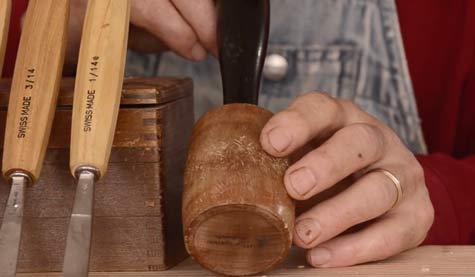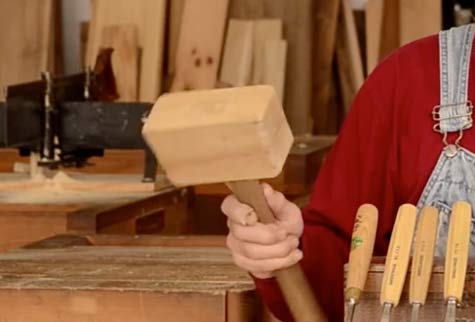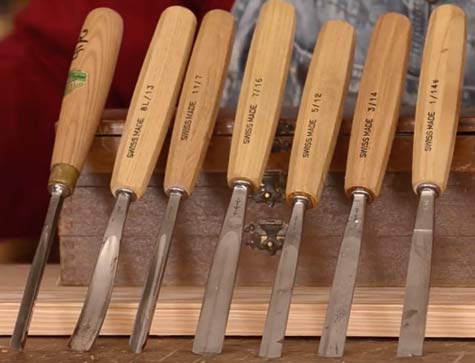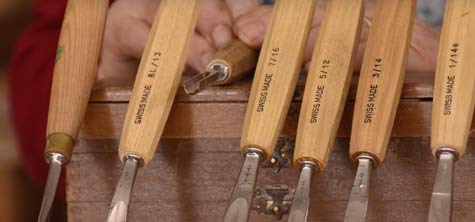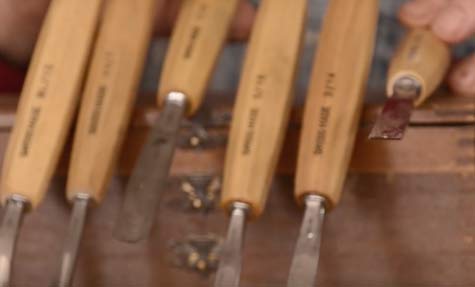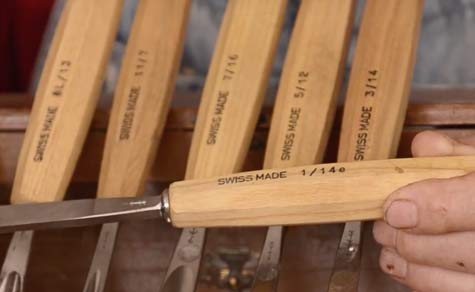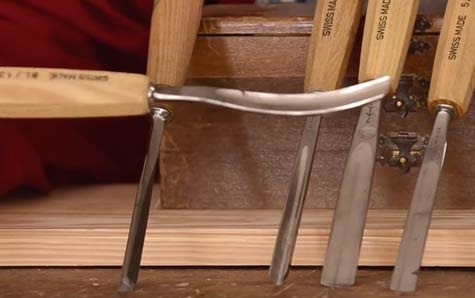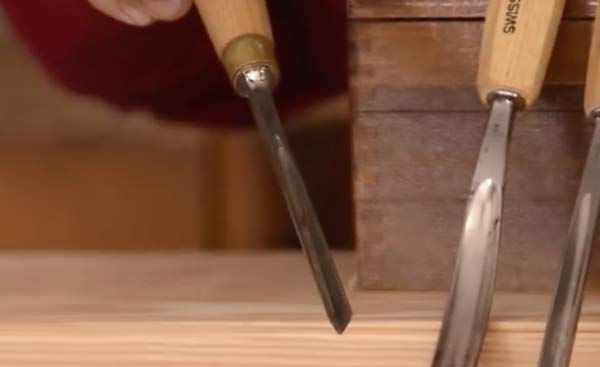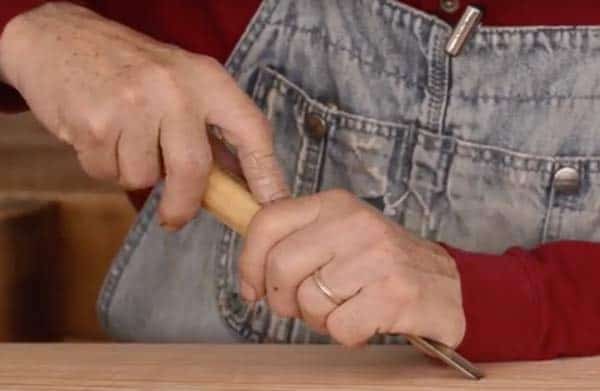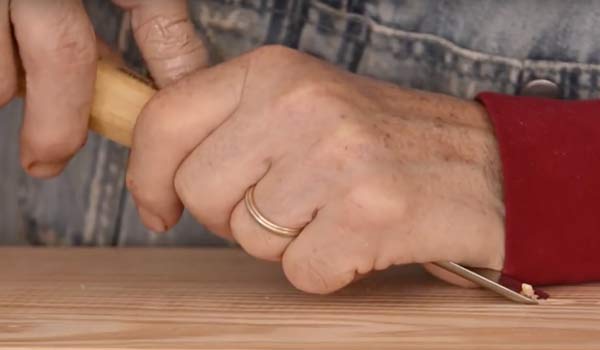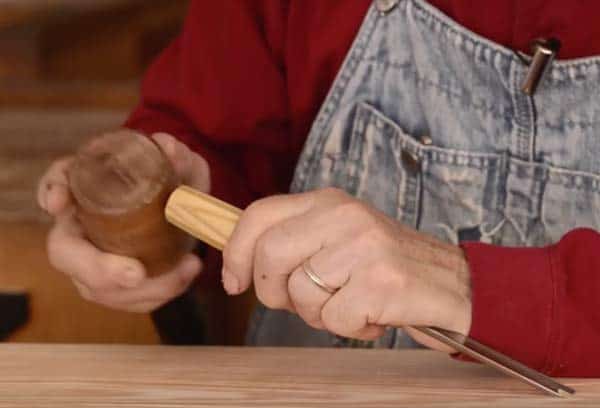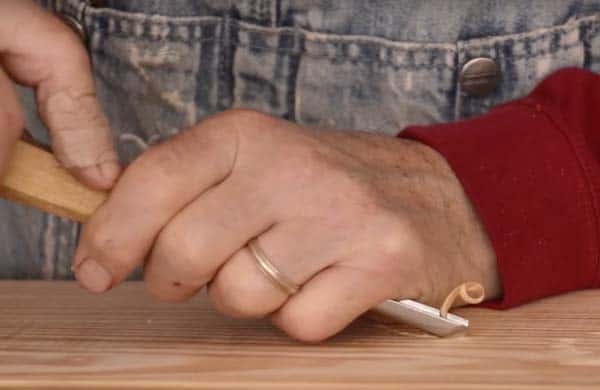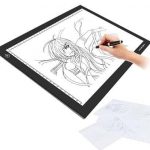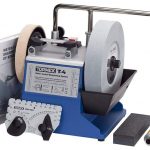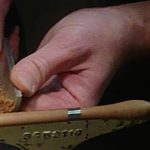Gouge chisel, V chisel basic wood carving sets
 In this wood carving illustrated article the grass roots tools are demonstrated with the basics of how to use them.
In this wood carving illustrated article the grass roots tools are demonstrated with the basics of how to use them.
A basic gouge chisel set may look plain and boring but it is amazing what can be done to a piece of wood with such a simple set of tools.
In the right hands these chisels can produce stunningly beautiful artwork and have done so for centuries.
Historical references for carving indicate that arid conditions in Egypt has allowed for the preservation of wood carvings dating back to 4000B.C. and no doubt there were wood carving tools stretching far back beyond that.
Carvers Mallet
This can be made of wood or brass and comes in different sizes often smaller than the one shown above. A really versatile tool as it is easy to handle and manoeuvres really well to vary the angle of strike.
Carpenters Mallet
A carpenters mallet is much larger and quite cumbersome. You will notice that it is flat faced and designed for chopping and heavier duty work . When compared with the carvers mallet you can see that the smaller tool would be better and more agile in this particular form of wood craft. Imagine trying to carve an intricate pattern with a carpenters mallet – like trying to crack a nut with a sledgehammer!
Outcannel Gouge chisels
As the name suggests these chisels are designed to gouge out small pieces of wood at a time. The set of seven gouge chisels shown range of ‘sweep’ (curvature of the chisel) from a flat tip on the right to an almost half circle chisel third from left. Outcannel gouge chisels have the bevel ground on the outside of the curve (incannel gouge chisels have the bevel ground on the inside of the curve).
Here you can see the distinct curve or ‘sweep’ of the outcannel gouge chisel with the bevel on the outer side of the curve.
In comparison The chisel on the far right has no ‘sweep’ to the blade and will provide a flat cut. This graduated curving provides a great variety for the wood carver allowing deep, shallow and flat cuts throughout the project in hand.
The chisels are graded form 1 to 11. No.1 is the flat edge and progresses up to no. 11 which had the most ‘sweep’. The other variation is the width of the chisel blade. So you can see there can be a considerable range of sets by width and curvature.
In the photo above the chisel is a No. 1 and has a blade width (point to point – rather than width of curve) of 14mm. You can see the different sizes of the chisels in the background.
Curved out cannel gouge chisel
This is an additional type to a standard set where the blade is curved back (there are others available with the curve in the front). This allows for a steeper cut and particularly useful for getting into steep edge cuts in the latter stages of your project.
‘V’ chisel
As the name suvvests the V chisel blade has a V shaped profile with a profile angle, generally between 30o– 60o. It is an excellent addition for your basic wood tool set as it is used to block out the outline shape and any intricate patterning. The blades of V chisels are set at different angles for different types of cuts. As a rule of thumb a 60o V chisel is a good general purpose chisel in a basic starter kit.
Hand position when using a carving gouge chisel
The hand position is very important so that the back hand pushes the chisel into the wood while the front hand is pushing in the opposite direction.
The second hand gives great control to the woodworker and enables them to work accurately and safely so that the chisel blade does not cut haphazardly. basically the back hand provides power for each cut and the front hand brakes, controls and stabilises the chisel.
Basic gouge chisel cuts
Using the two handed method shown small controlled cuts can be made with the gouge chisel dipping in and out of the wood.
The carvers mallet can be used for small sharp strikes or taps. You will notice in the above image further control has been gained by holding the head of the hammer rather than the handle.
To gain further control and to be able to successfully cut with and across the wood grain the chisel can be slightly ‘wiggled’ during the cut. This allows the tip to bite into the wood as it rocks from side to side.
This combination of rocking and hand control makes for a very steady and controlled cut. this is particularly useful when using the V chisel for marking out. Particularly when working the blade across and with the grain of the wood.
See Bill Andersons excellent video ‘Carving tools’ below

